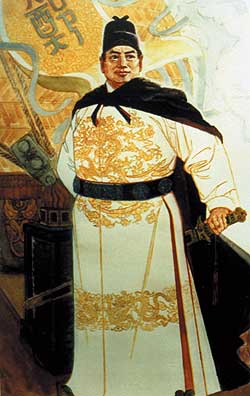Christopher Columbus: "Yes. In early 1492, I was inspired by Paolo Toscanelli, the book Image of the Worlds, and Marco Polo's ideas about the far east to go explore the Indies in the West. I hypothesized that the world was mainly land and the trip to Asia was shorter than most thought. I asked the Kind of Portugal to sponser my mission, but he declined. He knew I was excited for the adventure, but was mostly going after fame. I then asked Spain if they would sponser me and they accepted! It was April and I was thrilled! The first voyage I discovered some islands in Latin America, such as Hispaniola. Foolishly, I thought I was the Far East, which I was far from. Later, I made three more expeditions looking for this short path to Asia. I found none, of course, but did come to the Caribbean or the 'West Indies'."
Interviewer: "So you had no idea you were in America?"
Columbus: "None. It was not until Amerigo Vespucci in 1507 discovered I was actually no where near Asia, but on a completely new land."
Interviewer: "So how did you discover America?"
Columbus: "Honestly, I was not the first to fully discover or land on America. It had been done before, except my voyages inspired other Europeans and many began to settle in the new world."
Interviewer: "And would you say that is your biggest contribution to history?"
Columbus: "Yes, that area becomes the United States of America which then becomes an example for other countries that want to rebel against their ruler. Also, it becomes a very advanced country, even superpower later in history."
Interviewer: "Also the United States has a very good government"
Columbus: "Yes. It is unique and very successful."
("Christopher Columbus." World History: Ancient and Medieval Eras.
"European exploration." World History: Ancient and Medieval Eras.





















